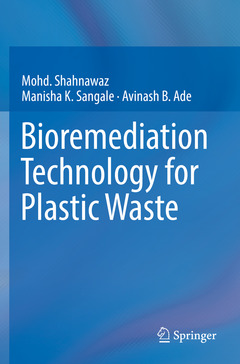Bioremediation Technology for Plastic Waste, 1st ed. 2019
Auteurs : Shahnawaz Mohd., Sangale Manisha K., Ade Avinash B.

Plastic is one of the widely used polymers around the globe since its discovery. It is highly impossible to think the ease of life without the aid of plastic. Every year billion tons of plastic waste gets accumulated in the environment and leads to death of both marine and terrestrial animals. Plastic is very durable and needs around 1000 years to degrade under the natural environment. The present book illustrates the importance and significance of the bioremediation to tackle the problem of plastic waste. Previously, we have reported elite rhizobacterial isolates (Lysinibacillus fusiformis strain VASB14/WL and Bacillus cereus strain VASB1/TS) of Avicennia marina Vierh (Forsk.) from the West Coast of India with the potential to degrade plastic (polythene). The present book attempted to address the bioremediation scenario of plastic waste (including micro plastic) using microbes with bacteria in particular. Various strategies used to tackle with the plastic waste were highlighted with case studies of plastic waste management, including in vitro, in situ and ex situ with a special reference to biodegradation technology. After the biodegradation of the plastic using microbes, the generated plastic (polythene) degradation products (PE-DPs) were also documented using GC-MS technique followed by their deleterious effect on both animal and plant systems. The book also enhances the awareness of the plastic-free society and also suggests some alternative materials to be used instead of plastic. Lastly, the book suggests/recommends the strategies to be followed by the lawmakers in the government organizations/non-government organizations/social organizations to frame the regulations and guidelines to implement at mass level to reduce the generation of plastic waste.
Module 1_Introduction.- Module 2_Microplastic.- Module 3_Plastic waste disposal and re-use of plastic waste.- Module 4_Case studies and recent update of plastic waste degradation.- module 5_Bacteria as key players of Plastic Bioremediation.- Module 6_In situ remediation technology for plastic degradation.- Module 7_Ex-situ remediation technology for plastic degradation.- Module 8_Social awareness of plastic waste threat.- Module 9_Analysis of the plastic degradation products.- Module 10_Toxicity testing of plastic degrading products.- Module 11_Policy and legislation/regulations of plastic waste around the globe.- Module 12_Conclusions and future needs.
Dr. Mohd. Shahnawaz is a DST-SERB National Post-doctoral Fellow at Plant Biotechnology Division, CSIR-Indian Institute of Integrative Medicine, Jammu and Kashmir, India. Previously, he has worked as a Lecturer in Botany at Department of Botany, Govt. Degree College Kishtwar, Jammu and Kashmir, India (2016-2017). He has earned his M. Phil. and Ph. D. in Botany from Department of Botany, Savitribai Phule Pune University, Maharashtra, India. He is the recipient of various fellowships awarded by the Savitribai Phule Pune University, University Grants Commission (UGC), and Department of Science and Technology (DST)-Science Engineering and Research Board (SERB), India. His research interests are focused on ecology, microbiology, bioremediation, and plant biotechnology. He has served as a referee for the number of International journals. He has been actively involved in teaching Cell biology, microbiology and plant biotechnology to the undergraduates students. Till now, he haspublished more than 15 research articles in the peer-reviewed international journals and authored or co-authored 5 books. He is also academic Editor of Asian Journal of Biology, SCIENCE DOMAIN international.
Dr. Manisha K. Sangale is an Assistant Professor in Botany at Department of Botany Rayat Shikshan Sanstha's S. M. Joshi College, Hadapsar, Maharashtra, India. Previously, she has served as an Assistant Professor at Department of Botany, Rayat Shikshan Sanstha's Yashvantarao Chavan Institute of Science, Satara, Maharashtra, India. She has earned her M. Phil. and Ph. D. in Botany from Department of Botany, Savitribai Phule Pune University, Maharashtra, India. She is a recipient of various fellowships and awards conferred by the Savitribai Phule Pune University and University Grants Commission (UGC), India. Her research interests are focused on the Phycology, Mycology, Ecology, Microbiology, and Bioremediation. She has served as the referee for a number of Intern
Date de parution : 08-2020
Ouvrage de 130 p.
15.5x23.5 cm
Date de parution : 06-2019
Ouvrage de 130 p.
15.5x23.5 cm



